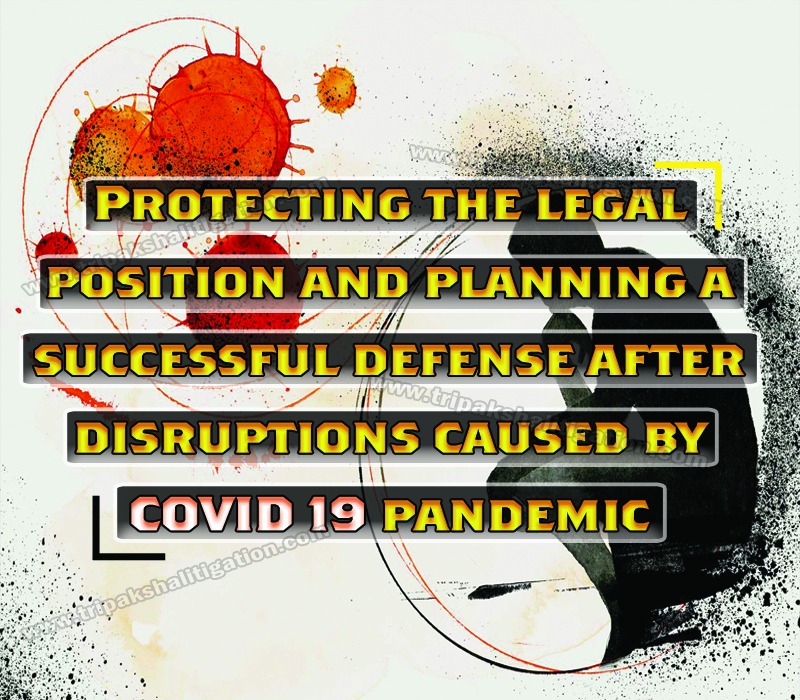The corona virus pandemic has claimed the lives of almost 82,000 people worldwide with close to 14,00,000 active cases on a global scale. India is hanging delicately in between the unpleasant exit from stage 2 and outbreak of stage 3, there are 5,200 approximate cases of COVID 19 in India with tally of deaths crossing the 150 mark in India and an addition of roughly half a thousand on a daily basis.
The country is facing unprecedented disturbance and the lifting of the lockdown on 15th April, 2020 seems a farfetched possibility and is a judicious step in tackling the pandemic and preventing the phase of community transmission.
The ramifications of the pandemic can be felt in every sector of India and same goes for the legal system of the nation.
With rampant litigation pending in India, here is a guide on how to defend your legal position successfully and planning a defense.
Here is a comprehensive compendium of the safeguards that can be taken during the lock down phase so that strong legal footing can be established after the lock down ends.
How Indian Courts are dealing with the pandemic
Effective and efficient planning is to be done for the phase after the lockdown ends but has to be conducted in the lockdown phase.
The Courts are closed and as a result it becomes proper for the litigants to used platforms that provide e governance of the judicial set ups to know about the dates of the Courts and the business of the Courts on that day.
For successful defense of the case, the lawyers and law firms are urged to opt for platforms/ applications wherein the knowledge is readily available rather than approaching the traditional practice of sending office clerks to the Courts for enquiring the progress of matters. The key to the same is effective communication.
The Hon’ble Supreme Court and the Hon’ble High Courts of the states have issued guidelines for the decongesting the prisons by granting interim bail and the parole to the prisoners [1] in offences that are not of serious nature.
Hence, the duty of the lawyers in successful communicating the above to the litigants or their families becomes all together more important and vital.
Moreover, Supreme Court issues slew of directions to implement video conferencing In all courts across the country[2] by a bench headed by Chief Justice S A Bobde, Justices D Y Chandrachud and L Nageswara Rao case titled SUO MOTU WRIT (CIVIL) NO.5/2020 order dated 06 /04/2020.
The video conferencing is a highly welcomed initiative which would simultaneously protect the litigants and lawyers from infection and also not let the course of a litigation derail because of the pandemic.
Bombay High Court
The Bombay High Court has decided to hear only urgent cases and this order also covers its Nagpur, Aurangabad and Goa benches. The court has also requested the bar to cooperate in restricting entry for only those whose presence is required for official purposes. Lawyers have been requested to inform the registry if they need their cases to be listed urgently from the day’s cause list and all other cases will get an automatic adjournment.
Securities Appellate Tribunal
The Securities Appellate Tribunal has also limited itself to hearing only urgent cases and has restricted entry in the courtroom to only lawyers, chartered accountants and one representative of the litigants. For adjournments, lawyers have been asked to write to the registry of the tribunal before 9:30 a.m. each day and then it will be placed before the bench on the same day. The counsels have been told that they needn’t visit the court premises to seek an adjournment.
These restrictions will be in place till March 27 and can be further extended.
Delhi High Court
Moreover the Delhi High Court has issued a direction that during the lockdown the limitation to file a case would be suspended as Courts are being treated as closed and no adverse orders are being passed during the said period.
If any Court still passes a negative order, then judicial safeguards are available to the litigant.[3]
The directions passed by the Courts run in tune with the public policy that the situation demands and hence the mechanisms can be utilized to plan and implement a defense strategy in a litigation that has been disrupted due to COVID 19 pandemic.
Legal issues that might arise during the lock down
The various legal issues that will spring up with this pandemic and the things to be kept in mind while dealing with them are as follows :-
Impact on demand and supply forces in the market
Considering the supply chain disruption caused by the COVID-19 outbreak, it is likely that performances under many contracts will be delayed, interrupted, or even cancelled. Counterparties (especially suppliers) to contracts may seek to delay and/or avoid performance (or liability for non-performance) of their contractual obligations and/or terminate contracts, either because COVID-19 has legitimately prevented them from performing their contractual obligations, or because they are seeking to use it as an excuse to extricate themselves from an unfavorable deal.
Impact of COVID 19 on the Indian Law of Contracts and Doctrine of Force Majeure
The Ministry of Health and Family Welfare has issued an advisory on social distancing [4], with respect to mass gathering and has put travel restrictions to prevent spreading of COVID-19.
In furtherance of the same on 19th February, 2020, an office memorandum O.M. No. 18/4/2020-PP[5] was issued. The Office Memorandum effectively states that the COVID-19 outbreak could be covered by a force majeure clause on the basis that it is a ‘natural calamity’, caveating that ‘due procedure’ should be followed by any government department seeking to invoke it.
In Merriam Webster Dictionary, the term force majeure has been defined as “superior or irresistible force” and “an event or effect that cannot be reasonably anticipated or controlled”.
In simple terms the COVID 1 would be treated as a natural calamity and an act of God and government has provided legal safeguards to a contractual obligation.
The entire jurisprudence (law) on the subject has been well summarised by the Supreme Court in a the recent decision in the case of Energy Watchdog vs CERC (2017)[6] along with the things to be kept in mind while invoking a clause of force majeure which are as follows:-
- Scope of application of force majeure – The general concept means that events or conditions beyond the reasonable control of one party should not hold them liable under the terms of a contract if that event or condition prevents the performance of contract. For seeking the protection such clause must be present in the contract. One may also rely on generic clauses usually included in force majeure clauses, such that the COVID-19 is an ‘Act of God’.
- Force majeure provisions vary widely – The language used in most contracts vary widely and, therefore, it is important to review these clauses carefully.
- Most contracts provide that for an event to qualify as force majeure, it must be unforeseeable or not reasonably foreseeable. So nature of the event has to be carefully determined.
- Notification requirements – Most contracts require notice to the other party to invoke a force majeure provision. Some also provide deadlines for making such notice to make the claim effective.
- Some contracts provide that it can be put on hold until the force majeure event is resolved. Some contracts provide for limitations in time after which either party may cancel the agreement with written notice to the other. Hence, limitations and timelines pertaining to the same are to be checked thoroughly.
- Burden of proof – The party that relies upon the force majeure event generally has the burden of proof and such clauses are construed strictly by the courts.
- Keep records – Copies of critical correspondence and other communications should be maintained if disputes arise later. This can be particularly important in establishing that the company has done all that was reasonably possible to mitigate the losses.
Some Landmark Rulings in India:
Deliberating on what is to be considered as a force majeure, in the seminal decision of Satyabrata Ghose v. Mugneeram Bangur & Co., [7], the Hon’ble Apex Court had adverted to Section 56 of the Indian Contract Act. The Supreme Court held that the word “impossible” has not been used in the Section in the sense of physical or literal impossibility. To determine whether a force majeure event has occurred, it is not necessary that the performance of an act should literally become impossible, a mere impracticality of performance, from the point of view of the parties, and considering the object of the agreement, will also be covered.
Subsequently, in Naihati Jute Mills Ltd. v. Hyaliram Jagannath[8], , the Supreme Court also referred to the English law on frustration, and concluded that a contract is not frustrated merely because the circumstances in which it was made are altered. In general, the courts have no power to absolve a party from the performance of its part of the contract merely because its performance has become onerous on account of an unforeseen turn of events.
In a nutshell, the Courts are of the view that in case of an unforeseeable act of God the contract , the defense of force majeure is available to a party if they are able to prove only a reasonable impracticality in performing their part in a contract.
It is not required to be proven that the whole contract is incapable of being performed because of the act.
COVID 19 is considered an act of God under the Indian legal parlance but still certain conditions mentioned above are to be fulfilled.
Consequences of not having force majeure clause in contract
If the contract does not include a force majeure clause, the affected party could be to resort to the doctrine of frustration under Section 56 of the Indian Contract Act, 1872. However, in order to claim that the contract is frustrated, it must be shown that performance of the contract is entirely impossible and that it has become fundamentally different from the arrangement contemplated at the time of executing the contract.[9]
- Impact of COVID 19 on Corporate sector
The corporate world is also untouched by the pandemic and would face the below issues in their functioning:-
Insolvency The spread of COVID-19 has already resulted in an increase in companies experiencing financial distress as they try to mitigate the financial impacts of supply chain issues coupled with lower customer demand. Companies with already high debt levels are finding existing credit lines withdrawn at a time when they are needing to pay suppliers who are able to deliver on time while not receiving customer payments.
The steps to be taken by the corporate so that they can tackle the challenges in a more efficacious manner
- Evaluation of the Business Continuity Risk – The board needs to get engaged with the management team to evaluate the business continuity risk, in case supply chain is disrupted for any critical raw material and empower the management team to take quick decisions in situations requiring immediate action.
- Be Informed – The board has an obligation to be reasonably informed and use good faith efforts in overseeing a company’s operations. A critical responsibility of the board in this regard is its oversight of material risks to the company.
- Consumer Connect – A constant communication with consumers should be maintained in order to keep them abreast of any disruption of services and allowing them the opportunity to secure alternate source of supply.
- Shareholder’s Interest – It is vital for the board to communicate with shareholders regarding the company’s assessment of potential impact of the COVID-19 and the company’s action plan to tackle the same.
- Regulatory Disclosures – Listed entities would need to ensure that if there is a material effect on the business or operations of the company like closure of an important manufacturing facility due to supply chain disruptions, the required intimation needs to be sent to the stock exchanges where the company’s shares are listed.
- Disclosures under financing documents – The company would need to carefully monitor if it is in compliance with various financial covenants under the borrowing documents and also assess the need to change or re-negotiate such terms with the lenders.
Workplace Issues
The COVID-19 outbreak could begin to throw up a variety of employment law issues relating to travel, health and safety concerns, sickness and absence. Below is a high-level overview of the key workplace related issues that employers should consider:
Employer’s obligations – Employers are generally obligated to ensure a safe and healthy work environment for their employees, temporary workers, trainees and staff.
The same can be ensured by taking the below steps:-
- Leave entitlement – There is no legal requirement under Indian law to grant leave for COVID-19 patients in excess of what is statutorily mandated or contractually agreed upon. Given the communicable nature of the disease, it may be advisable for the employers to allow affected employees to proceed on paid leave.
- Termination – It is advisable that the employers do not terminate any employee on the ground of he/she being a COVID-19 patient or suspected patient.
- Work from home – The employer may, in principle, allow an employee to work from home. The employer may audit available IT hardware and software, and close any gaps if required to ensure that the IT system is robust and functional during such remote access.
- Entry into workplace – An employer has a legal right and an obligation to prevent an employee who is suffering from communicable diseases like COVID-19 from entering the workplace for the protection of other employees.
- Respect Employee Privacy and Avoid Discrimination – Employers should treat employee health information as confidential and should ensure that their policies apply to all employees.
Conclusion Since the pandemic is of unprecedented nature and the extent and impacts of the same have not yet fully unfolded, hence precaution and sound knowledge of the affected areas is the only way to move forward in an environment of uncertainty. With almost every sphere touched by the pandemic, the above tools are the only guiding light.
[1] The decision was taken in a meeting of the High Powered Committee under the Chairmanship of Delhi High Court Judge and Executive Chairperson of Delhi State Legal Services Authority, Justice Hima Kohli.
[2] https://www.livelaw.in/top-stories/covid-19-sc-issues-slew-of-directions-to-implement-video-conferencing-in-all-courts-across-the-country-read-order-154853?infinitescroll=1
[3] https://www.livelaw.in/news-updates/covid-19-delhi-hc-subordinate-courts-shut-down-till-april-4-limitation-not-to-run-during-suspension-period-154237
[4] https://www.mohfw.gov.in/pdf/SocialDistancingAdvisorybyMOHFW.pdf
[5] https://doe.gov.in/sites/default/files/Force%20Majeure%20Clause%20-FMC.pdf
[6] The decision was passed by the Supreme Court on 11/04/2017 by a bench comprising of Justice Pinaki Chandra Ghose and Justice Rohinton Fali Nariman in Civil Appeal Nos.5399-5400 of 2016.
[7] 1954 SCR 310
[8] 1968 (1) SCR 821
[9] Satyabrata Ghose v. Mugneeram Bangur & Co 1954 SCR 310
You may contact me for consultation or advice by visiting Contact Us








